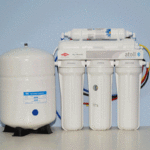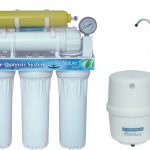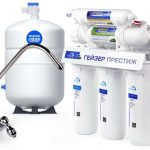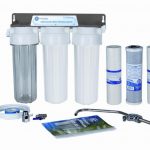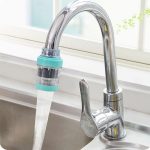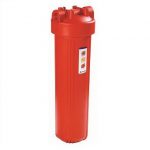Plain water from a centralized water supply can cause serious illness, of course, if you do not take timely measures. One of the most important criteria for the quality of a liquid is the level of its rigidity, which special types of filters can normalize.
Content
What harm does hard water bring?
This question is asked by many users living both in apartments and in private houses. In addition to hardness, there is a high level of chlorine, excessive amounts of iron, harmful microorganisms, bacteria and minerals. But as always, the most unremarkable factor can play a cruel joke on human health.
Two components are directly related to such a liquid parameter as rigidity - these are calcium and magnesium, or rather their high content. But the content of calcium and magnesium in a liquid can be variable, it is also influenced by insoluble salts, which are responsible for the constant hardness of water. Soluble salts are considered more positive, although they are the cause of the scum that occurs in an electric kettle or washing machine.
But we should stop on the main question: is hard water harmful? Unfortunately yes. And the consequences for human health may be as follows:
- A gradual blockage of the skin occurs. This leads to excessive dryness and the appearance of various skin-related diseases (e.g. dermatitis).
- The appearance of dandruff, as well as a deterioration in the condition of the hair. Unpleasant, ongoing itching may occur. Even expensive shampoos and hair balms do not always help.
- The gradual deposition of salts in the body, which eventually leads to kidney stones. In addition to the kidneys, the cardiovascular system also suffers, a gradual blockage of blood vessels occurs.
We should also mention the negative impact of hard water, for example, from a well, on the state of household appliances. A few years are enough, and a layer of scale on the inner surface of the washing machine will lead to its breakdown. But most often, electric kettles suffer, the heating elements of which are not designed for excessive amounts of salts in the liquid.
What water parameters are critical
Determining the hardness of water at home is quite problematic, for this it is necessary to purchase a special test kit, presented in the form of a small strip that changes color. You can also use the services of a private laboratory, which make water analysis at affordable prices.
After obtaining data on water hardness, you should compare them with generally accepted standards:
- Up to 2 ° W - soft water.
- From 2 to 10 ° W - the average level of rigidity of the liquid.
- More than 10 ° W - hard water.
There is an approved document with sanitary and hygienic standards - SanPiN 2.1.4.1074-01, which states that the water hardness should not exceed 7 mEq / l. This statement applies to water from a centralized water supply.
It should be clarified that even a stiffness of 4 ° F will very soon leave the result on the surface of electric heaters. Therefore, it is better to reduce the stiffness parameter using special filters or household cleaning systems.
What are polyphosphates and how to use them correctly
Modern chemically active additives are increasingly used in various industries. Of course, the greatest use is traced in the industrial sector, followed by household and industrial chemicals.With the development of modern technologies, there is a significant minimization of the harmfulness of such substances, and very soon chemically active additives will be equated with biologically pure products.
And it is precisely with the softening of the liquid that chemical additives are most used. This may be the usual use of soda, but polyphosphates or antiscalant compounds of a new generation are most often used. All of the above substances are reagents, and the chemical method of reducing the rigidity of a liquid using such additives is a reagent.
It is necessary to consider the most popular ways of softening water, which include:
- Use soda, and sometimes lime. A more productive option for softening water is to prepare a solution in which soda and lime are added in equal proportions. Unfortunately, only water for technical needs can be softened with these ingredients, it is forbidden to use it as drinking.
- The use of polyphosphates. Polyphosphates belong to the category of crystals having rather large sizes, which makes them very convenient to use in modern filtering systems. Polyphosphates are placed in a filter, most often a cartridge filter, after which water passes through it. The crystals gradually dissolve and bind salts in the liquid, which give it rigidity.
And if soda is now used extremely rarely, then polyphosphate methods are widely known. But not in the quality of drinking water. It is proved that polyphosphates belong to the category of fertilizers adversely affecting human health. They create a favorable soil for the development of the environment, in which oxygen is removed from the liquid, which is necessary for the living organism to function properly.
Therefore, a more expensive method is to clean the liquid with antiscalants, which are also chemically active components with a short decay period, after which these substances have no effect on the environment. Antiscalants are rarely used, due to the need to install expensive equipment, which not only has a high cost, but also is very expensive to maintain.
Varieties of filters for softening water
Modern filters are able to cope with a liquid of any hardness level, which is a constant problem for users whose homes are connected to a centralized water supply.
The most popular and productive are filter models that work on the principle of reverse osmosis. After the cleaning procedure, not only the hardness of the liquid decreases, but harmful bacteria and microorganisms also die, and the water undergoes mineralization. After a reverse osmosis filter, water not only becomes useful, but also acquires a unique taste.
A cheaper option is a water filter that creates a magnetic field that affects the structure of the liquid and reduces salt levels. Such a device has not only an understandable and simple design, but also has a quick installation that does not require the involvement of specialists. It is enough to fix the filter on the water pipe, and you can enjoy tasty and soft water.
As a separate type of device, filters for cleaning liquid from iron can be called. Few users know, but iron molecules also affect the hardness of water, as well as salts. To select such a filter, it is necessary to know exactly the structure of the material contained in the water, since there are no universal devices for cleaning iron. In such products, in addition to the coarse filter, UV cartridges are also installed.
Filter systems of the “under the sink” type are very popular. They significantly soften the liquid due to the presence of 5-6 cleaning levels in its structure. Together with salts, harmful bacteria and microorganisms, minerals, chlorine compounds are removed from the water.The first cleaning steps are cartridges that prevent further movement of sand, lime or river sludge.
And universal water softeners complete the rating of liquid softeners. These devices are compact and economical in terms of energy consumption. The basis of their work is the replacement of potassium and magnesium molecules with softer sodium and potassium. Today, ion-exchange filters are used as emollients, in the design of which there is a certain amount of ion-exchange resin. In this case, backwashing of the liquid occurs. Water after ion-exchange filters is not only devoid of harmful varieties of salts, but also has a pleasant taste.
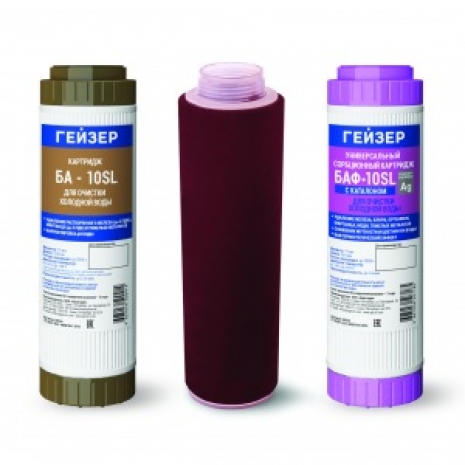
How to choose the right filter for water purification
When choosing a filter, you should be guided by some standards and generally recognized technical data.
- Type of filter. Water purification systems have the following varieties: pitcher type, coarse or preliminary treatment, trunk, special devices for normalizing the level of iron, reverse osmosis, “under the sink”. In almost every type of filter, an additional softener section can be installed. Before buying a device, you should definitely clarify this feature of the configuration.
- Degree of purification. Of course, the maximum number of degrees of purification guarantees a cleaner and tastier outlet water. Especially if it is a reverse osmosis system in which from 5 to 6 degrees of purification can be installed. This amount includes the removal of large particles, coal cleaning of the liquid, ionization and mineralization, as well as the main function - softening.
- The presence of a reverse osmosis system, extremely effective due to its design features due to the presence of a membrane. The reverse osmosis system allows you to filter water at a completely different level, without missing even the smallest pollutants.
The right choice of filter will allow you to purchase a device with maximum functionality (cleaning), respectively - clean and tasty water at the outlet. The filter for hard water will be an ideal solution both in the apartment and for the house.
